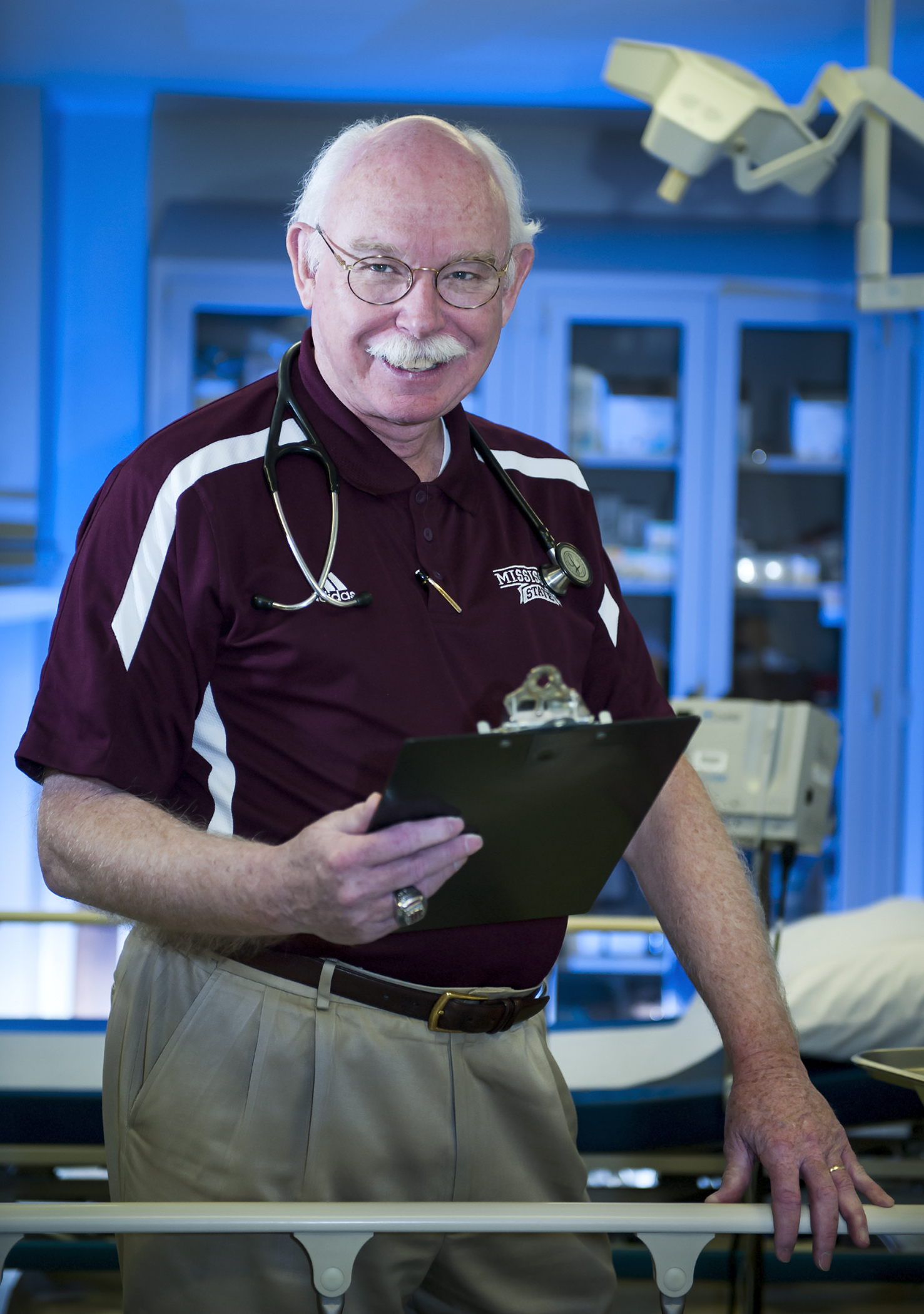Contact: Leah Barbour

Photo by: Russ Houston
STARKVILLE, Miss.--Dr. Robert K. "Bob" Collins of Mississippi State is this year's selection for the Jack C. Hughston, M.D., Sports Medicine Person of the Year award.
Presented by the Southeast Athletic Trainers Association at its recent annual conference, the honor recognizes the family practitioner's 35-year university career.
In addition to heading University Health Services, he is the Davis-Wade Stadium medical director. The Millsaps College and University of Mississippi Medical Center graduate who came to MSU in 1977 will retire in May at the end of the spring semester,
SEATA's selection of Collins paid tribute to his long and continuing commitment to learning about athletic injuries, serving both athletes and athletic trainers, and researching the best treatment options.
Collins said he considers athletic trainers to be the glue that keeps teams functioning, often working 60-80 hours a week and propelled by a passion to take care of their players.
He also said he was humbled to be listed among such "high cotton" with others who previously received the recognition named for the orthopedic surgeon and administrator considered among the "fathers" of U.S. sports medicine. The honor is the highest given to a person who is not an athletic trainer.
"I take the service role seriously, and for the athletic trainers to recognize me, that's a special honor," Collins said. "If you view the coach as the father, then without a doubt, the athletic trainer is the mother. I've always supported every athletic trainer I've ever known, and I try to help any time I can and further the profession of athletic training."
Collins' widely known commitment to healthy living continued the tradition of his predecessor, who also was recognized regionally for his sports medicine leadership.
"John Longest, the person for whom MSU's health center is named, was the first (Hughston) recipient in 1988, the year he retired and I took over," Collins said.
"So here I am, ready to retire, and I'm being named to that same tradition with the same award," he added.
Collins said he "always has been a big believer in evidence-based medicine and the continuous quality improvement model. Still, the athletic trainers on the ground are the ones who know what to do. Just listen to them and give them a voice."
He added: "For them to recognize me, again, that's mighty tall cotton."
In addition to professional accomplishments in sports medicine, the board-certified family practitioner and Farmington, N.M., native, has been a campus, state and regional leader in promoting anti-tobacco efforts, AIDS education, preventative care, and the application of computer technology in medicine.
Active in the American College Health Association, he was named as an ACHA Fellow in 1999. Earlier, he received the organization's Ollie M. Moten Service Award for his roles as chair and program director of the athletic medicine section, and other related ACHA duties.
"I promote exercise as a healthy behavior, and it dovetails into sports nicely," he said. "The Moten Award is given by the ACHA to people who have advanced college health on their campus and, that, right behind being elected a Fellow, has been important."
During Collins' decades as director, the Longest Student Health Center received the formal stamp of approval by the Accreditation Association for Ambulatory Health Care Inc. The two-story, red-brick facility at the intersection of Hardy and Morrill roads also has been designated as an AAAHC Model of Continuous Quality Improvement.
"I would put this health center up against any health center in the United States as far as how progressive it is, how technologically current it is and how efficiently it provides care for its clients," Collins said. "That I will take credit for; that was my foresight, that's what I saw could happen. I brought it where it needs to be, and now it's time to let someone else pick it up and carry it."
Dr. Clifton Story, a physician at the center, will become Collins' successor.
Even in retirement, Collins said he isn't particularly interested in slowing down. In addition to travel, hiking and resuming some hobbies, he said he will be receptive to working part-time at the health center if needed.
"In the end, it comes down to working with people," he said.